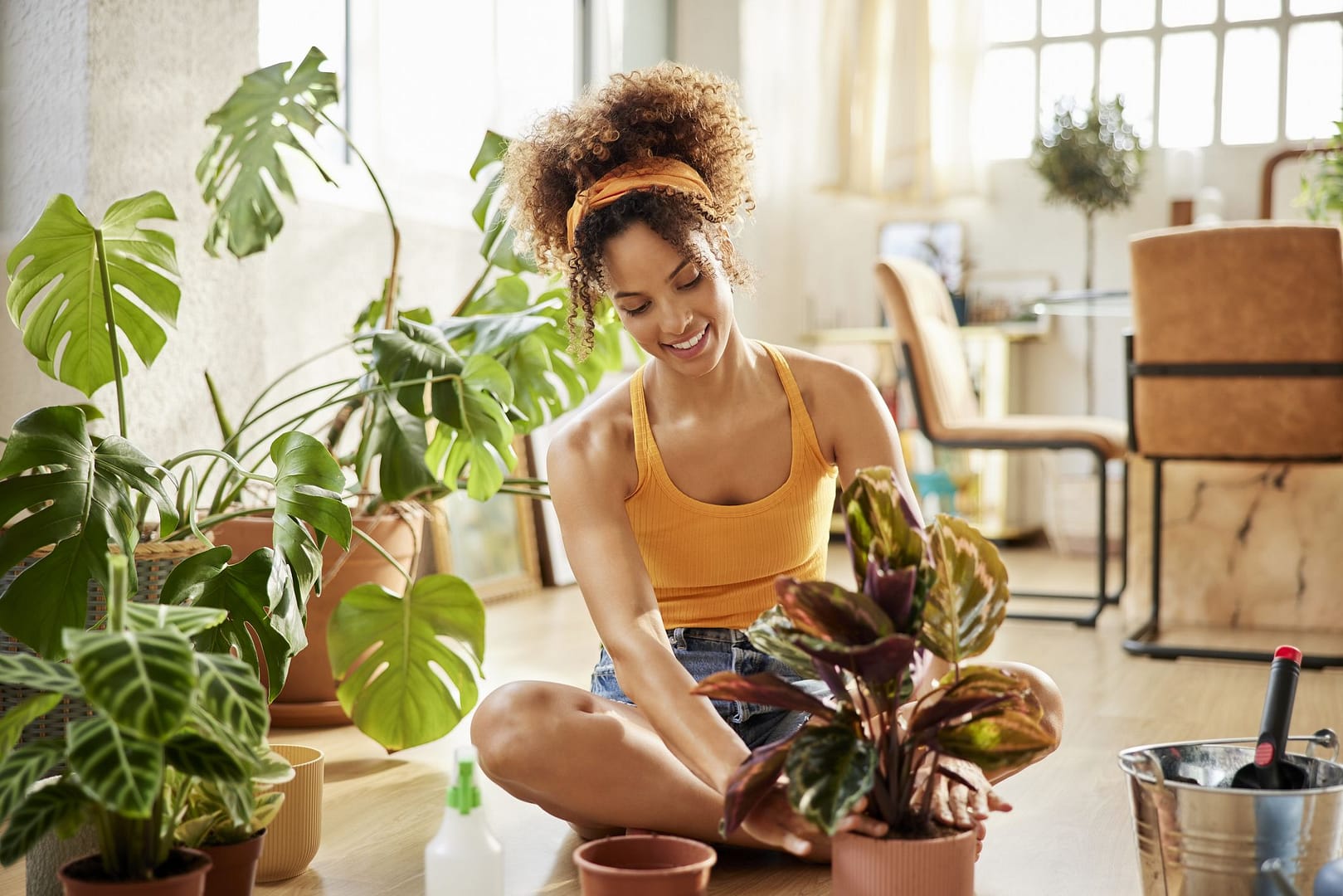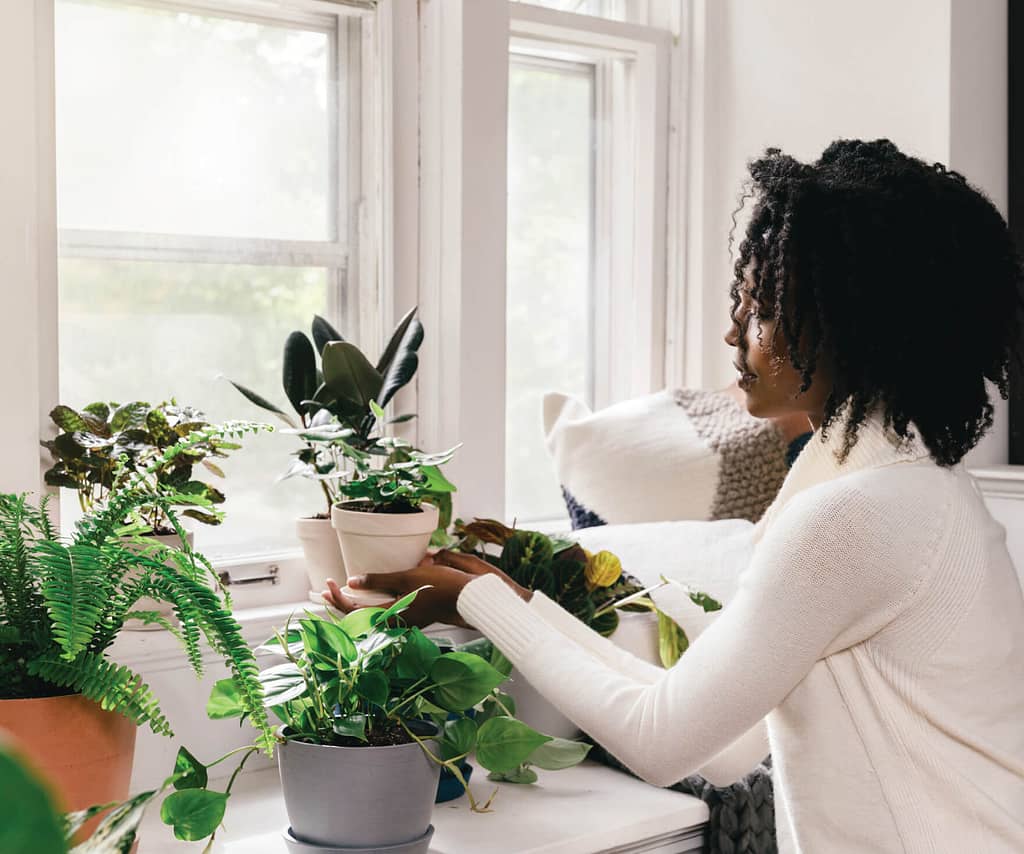The Benefits of Indoor Gardening for Your Mental Health

In recent years, indoor gardening has gained popularity as a rewarding and accessible hobby for people of all ages. By bringing elements of nature inside, indoor gardening allows individuals to cultivate a wide variety of plants, from vibrant flowers to practical herbs, all within the comfort of their homes. The practice not only adds aesthetic value to living spaces but also connects us to the natural world uniquely and intimately.
In today’s fast-paced world, the importance of mental health cannot be overstated. With the growing demands of modern life, many people experience high levels of stress, anxiety, and other mental health challenges. Finding effective and sustainable ways to enhance mental well-being has become more crucial than ever.
Indoor gardening offers a powerful and multifaceted approach to improving mental health. The act of nurturing plants can provide a sense of purpose, reduce stress, and create a peaceful environment. Studies have shown that interacting with indoor plants can elevate mood, boost productivity, and even enhance cognitive function. By fostering a connection with nature through indoor gardening, individuals can experience significant improvements in their overall mental well-being.
Table of Contents
1. Stress Relief
Explanation of How Plants Can Reduce Stress Levels
Indoor plants have been shown to significantly reduce stress levels in a variety of ways. Their presence can create a calming atmosphere, which helps to lower blood pressure and reduce anxiety.
The act of caring for plants, such as watering, pruning, and repotting, provides a mindful and repetitive activity that can distract from stressful thoughts and induce a state of relaxation.
Furthermore, the visual appeal and natural beauty of plants can have a psychologically soothing effect, promoting feelings of tranquility and comfort.
Examples of Stress-Reducing Plants
Some plants are particularly effective at reducing stress due to their specific properties and the sensory experiences they provide. For example:
- Lavender: Known for its soothing scent, lavender is often used in aromatherapy to alleviate anxiety and promote restful sleep.
- Aloe Vera: This versatile plant not only has healing properties but also releases oxygen at night, which can improve air quality and help you sleep better.
- Snake Plant: With its ability to filter airborne toxins and release oxygen, the snake plant contributes to a cleaner and more relaxing indoor environment.
- Spider Plant: Easy to care for and visually appealing, spider plants are excellent at purifying the air and are known to reduce stress.
Personal Anecdotes or Testimonials
Many individuals have shared their personal experiences of how indoor gardening has positively impacted their mental health.
For instance, Sarah, a software engineer, found that taking short breaks to tend to her indoor plants throughout the day helped her manage work-related stress. “Watering my plants and seeing them thrive gives me a small, but significant sense of accomplishment,” she says.
Similarly, James, a retiree, started an indoor herb garden and noticed a marked reduction in his anxiety levels. He explains, “Caring for my herbs gives me a daily routine and something to look forward to. The fresh scent of basil and rosemary in my kitchen instantly lifts my mood.”
These testimonials underscore the significant and varied ways indoor gardening can contribute to stress relief and overall mental well-being.
2. Improved Mood
The Role of Greenery in Boosting Mood
The presence of greenery in our living spaces can have a profound impact on our emotional well-being. Plants add life and vibrancy to any room, creating an environment that feels more inviting and peaceful.
The colors of nature, particularly green, are known to have a calming effect on the human psyche. The act of simply looking at plants can trigger a connection to the natural world, reducing feelings of sadness and promoting a more positive outlook.
Scientific Studies Linking Indoor Plants to Happiness
Numerous scientific studies have explored the relationship between indoor plants and happiness. One such study conducted by researchers at Texas A&M University found that environments enriched with plants helped improve memory retention and concentration by as much as 20%.
Another study published in the Journal of Physiological Anthropology suggested that interacting with indoor plants can reduce physiological and psychological stress. Participants who transplanted an indoor plant reported feeling more comfortable, soothed, and natural compared to those who performed a computer task.
These findings suggest that incorporating plants into indoor spaces can significantly enhance emotional well-being.
Tips for Creating a Mood-Enhancing Indoor Garden
Creating an indoor garden that boosts your mood doesn’t have to be complicated. Here are some tips to help you get started:
- Choose Happy Plants: Opt for plants that are known to have mood-lifting properties such as snake plants, peace lilies, and succulents. These plants are low-maintenance and bring a touch of nature indoors.
- Maximize Natural Light: Position your plants near windows or invest in grow lights to ensure they receive adequate sunlight. Natural light not only benefits the plants but also helps brighten your living space.
- Incorporate Scented Plants: Aromatic plants like lavender, jasmine, and mint can enhance your mood with their pleasant scents. Place them in spaces where you spend the most time for an instant uplift.
- Create a Mini Sanctuary: Dedicate a corner of your home to a cluster of plants, forming a small indoor oasis. Add a comfortable chair or cushion to the area, making it a perfect spot for relaxation and reflection.
- Personalize Your Space: Use decorative pots and planters that reflect your style. This not only adds a creative touch but also makes the gardening process more enjoyable.
By thoughtfully selecting and arranging indoor plants, you can cultivate a space that continually nourishes and uplifts your spirits.
3. Enhanced Concentration and Productivity
The Impact of Plants on Cognitive Function
The presence of indoor plants can have a remarkable effect on cognitive function, enhancing both concentration and productivity. Studies have shown that individuals working in environments that include plants tend to have better focus, improved memory retention, and greater mental clarity.
The subtle stimulation provided by greenery can help to keep the mind alert and engaged, reducing the likelihood of mental fatigue.
How Indoor Gardening Can Help with Focus and Creativity
Indoor gardening not only improves the aesthetic appeal of a workspace but also provides tangible cognitive benefits. The act of caring for plants, such as watering and pruning, can serve as a mental break from more strenuous tasks, offering a moment of calm and rejuvenation. This brief respite can clear the mind, making it easier to return to work with a fresh perspective.
Additionally, the natural elements and varying shades of green can inspire creativity, fostering an environment where innovative ideas can flourish.
Suggested Plants for Home Offices or Study Areas
If you are looking to enhance your home office or study area with plants, consider these options that are particularly well-suited for boosting focus and productivity:
- Pothos (Epipremnum aureum): Known for its low maintenance and air-purifying qualities, Pothos is an excellent choice. Its trailing vines can add a touch of greenery without taking up too much space.
- ZZ Plant (Zamioculcas zamiifolia): This hardy plant can thrive in low light and requires minimal care, making it perfect for busy workspaces. Its glossy leaves add a sophisticated touch to any room.
- Rubber Plant (Ficus elastic): With its broad, shiny leaves, the Rubber Plant not only enhances air quality but also adds a bold, vibrant look. It thrives in indirect light, making it suitable for indoor environments.
- Peace Lily (Spathiphyllum): Beyond its elegant appearance, the Peace Lily is known for its ability to filter indoor air pollutants, creating a healthier workspace. It also emits a subtle, calming fragrance.
- Mint (Mentha): Easy to grow indoors, mint not only provides a fresh aroma but can also be used in beverages and foods. Its invigorating scent can help to keep your mind alert and focused.
By incorporating these plants into your study or work environment, you can create a space that supports both cognitive function and overall well-being, ultimately contributing to enhanced concentration and productivity.

4. Therapeutic Benefits
The Concept of Horticultural Therapy
Horticultural therapy, also known as gardening therapy, is a practice that involves engaging individuals in gardening activities to promote emotional and mental well-being.
This form of therapy leverages the therapeutic benefits of working with plants, providing a hands-on, immersive experience that can alleviate symptoms of various mental health conditions. It is effective in reducing stress, enhancing mood, and providing a sense of purpose and accomplishment.
Benefits for Individuals with Depression or Anxiety
For individuals living with depression or anxiety, horticultural therapy offers multiple benefits. The act of nurturing plants can provide a calming and grounding effect, aiding in the reduction of anxiety levels.
The routine of caring for plants creates a structure that can be particularly beneficial for those dealing with depression, fostering a sense of responsibility and routine. Additionally, the visual and sensory stimulation from plants can serve as a positive distraction, redirecting focus away from negative thoughts and feelings.
Real-life Examples of Therapeutic Indoor Gardening Programs
Several programs around the world demonstrate the effectiveness of indoor gardening as a therapeutic tool. For instance, the “Green Care” initiative in Norway includes indoor gardening as part of its treatment for mental health patients. Participants have reported significant improvements in mood and a decrease in anxiety attacks.
Similarly, “Project Roots” in the UK, which incorporates indoor plant care as part of its holistic treatment approach, has seen participants show marked progress in their ability to manage symptoms of depression. These programs highlight the power of horticultural therapy in fostering mental resilience and emotional recovery.
5. Sense of Accomplishment
The Joy of Nurturing and Growing Plants
One of the most rewarding aspects of indoor gardening is the sense of accomplishment that comes from nurturing and growing plants. Watching a small seedling develop into a thriving plant under your care offers unparalleled satisfaction.
Each new leaf, bloom, or fruit serves as a testament to your efforts and dedication, fostering a deep emotional connection with your green companions. This process not only gives you a tangible reminder of your hard work but also provides a continuous source of joy and pride.
How Setting Gardening Goals Can Improve Self-Esteem
Setting specific gardening goals can play a significant role in enhancing self-esteem. These goals can range from successfully propagating a new plant to maintaining an herb garden that provides fresh ingredients for your meals.
Achievable gardening goals create a sense of purpose and direction, offering small, consistent victories that can boost confidence.
Moreover, overcoming challenges such as pest control or plant diseases can strengthen problem-solving skills and resilience, further contributing to a positive self-image.
Tips for Beginners to Start Their Indoor Gardening Journey
For those new to indoor gardening, getting started may seem daunting, but with a few practical tips, the journey can be both enjoyable and successful:
- Start Small: Begin with a few easy-to-care-for plants like succulents, spider plants, or snake plants. These are hardy and can thrive with minimal attention.
- Learn About Your Plants: Research the specific needs of your plants, such as light, water, and soil requirements. Understanding these basics will help you provide the best care.
- Use Proper Containers: Ensure your plants are in containers with drainage holes to prevent waterlogging, which can lead to root rot.
- Establish a Routine: Set a regular schedule for watering and fertilizing your plants. Consistency is key to keeping them healthy.
- Monitor and Adjust: Keep an eye on your plants and be willing to adjust their care based on their responses. For instance, if leaves turn yellow, it could indicate overwatering or insufficient light.
- Seek Community Support: Join online gardening forums or local plant groups where you can share experiences, ask questions, and learn from others.
With these tips, beginners can embark on their indoor gardening journey with confidence, discovering the many joys and benefits of nurturing their indoor oasis.
6. Improved Indoor Air Quality
The Role of Plants in Filtering Indoor Air Pollutants
Plants play a crucial role in improving indoor air quality by filtering out common pollutants. Through a process called phytoremediation, plants absorb contaminants through their leaves and roots, converting them into harmless substances that are stored within their tissues or released back into the environment.
This natural filtration system helps reduce the levels of volatile organic compounds (VOCs), carbon monoxide, and other harmful chemicals often found in indoor spaces. Not only do plants add aesthetic value to your living or working area, but they also contribute to a healthier indoor atmosphere.
Health Benefits of Cleaner Indoor Air
Breathing cleaner air has numerous health benefits, particularly for individuals with respiratory conditions like asthma or allergies. Improved indoor air quality can reduce the frequency and severity of asthma attacks and lessen allergic reactions.
Additionally, cleaner air helps in enhancing overall lung function and can alleviate symptoms of headaches, dizziness, and fatigue. The presence of plants also increases humidity levels, which can prevent dry skin and respiratory discomfort, thereby promoting overall well-being.
Recommended Air-Purifying Plants
Incorporating air-purifying plants into your indoor environment is an excellent way to boost air quality. Here are some highly recommended options:
- Spider Plant (Chlorophytum comosum): Known for its air-purifying capabilities, spider plants are excellent at removing formaldehyde and xylene.
- Boston Fern (Nephrolepis exaltata): This lush plant is effective at filtering out formaldehyde and is known for its ability to humidify the air.
- Snake Plant (Sansevieria trifasciata): Also known as mother-in-law’s tongue, this hardy plant excels at removing toxins like formaldehyde, benzene, and trichloroethylene.
- Peace Lily (Spathiphyllum): Besides its elegant appearance, the Peace Lily is adept at removing VOCs, including formaldehyde, benzene, and carbon monoxide.
- Aloe Vera (Aloe barbadensis miller): Not only useful for its soothing gel, Aloe Vera effectively clears benzene and formaldehyde from the air.
By strategically placing these air-purifying plants throughout your home or office, you can enjoy the benefits of cleaner air and create a healthier indoor environment.
7. Conclusion
Recap of the Mental Health Benefits of Indoor Gardening
Indoor gardening offers a multitude of mental health benefits. From fostering a sense of accomplishment and enhancing self-esteem to providing stress relief and emotional recovery, tending to plants can profoundly impact overall well-being.
The nurturing relationship formed with plants encourages mindfulness and provides a sense of peace and satisfaction in daily life.
Encouragement to Start or Expand an Indoor Garden
Whether you’re a seasoned gardener or a complete novice, there’s always room to grow your indoor garden. Starting small with easy-to-care-for plants or setting new gardening goals can bring new joy and challenges to your routine.
Don’t be afraid to experiment with different plants and techniques, as each success and learning experience adds value to your gardening journey.
We invite you to share your indoor gardening experiences and tips. Whether you’ve found a particular plant that thrives in your home or a technique that works wonders, your insights can inspire and help others in the community.
Join gardening forums, engage with local plant groups, or simply share your stories on social media to connect with fellow enthusiasts and celebrate the joys of indoor gardening together.





